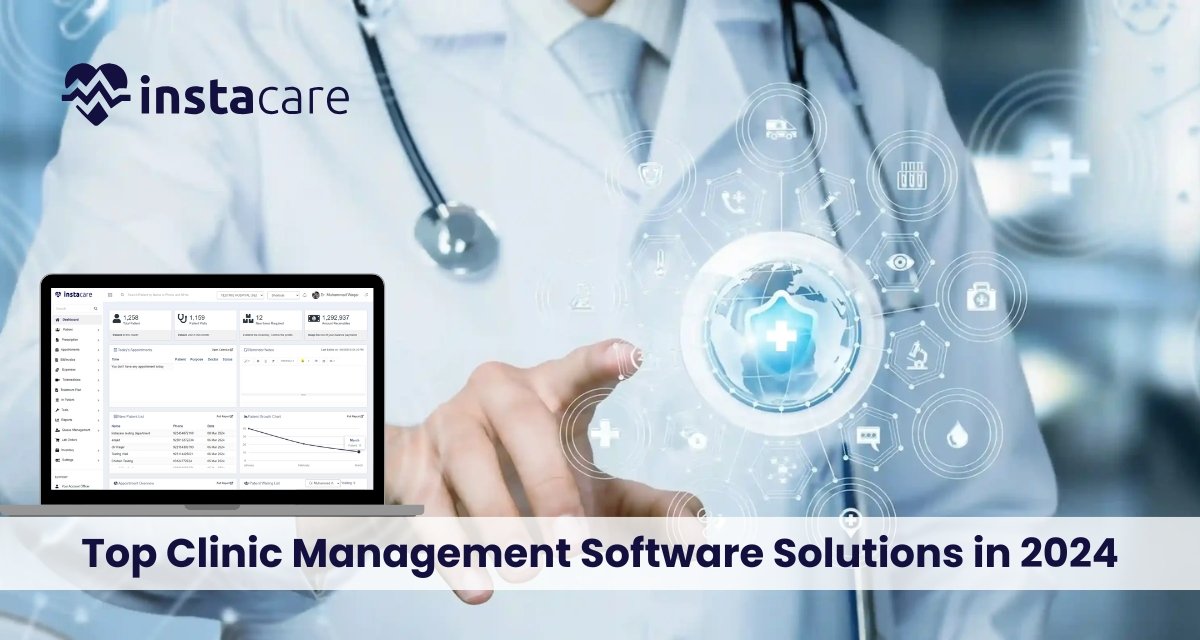Last updated on Tuesday, 19, November, 2024
In this healthcare landscape, clinic management software helps in optimizing operations, enhancing the quality of care provided to patients, and simplifying administrative tasks. As the year progresses into 2024, different clinic management software solutions meet the distinct needs of clinics – from very small practices to large healthcare centers. The following guide discusses the top clinic management software available this year and their respective features, benefits, and what puts them at the forefront of the competitive market.
Table of Contents
1- InstaCare
InstaCare offers a cutting-edge solution for the management of healthcare operations in clinics of all sizes. InstaCare is a user-friendly clinic management platform that bundles rich functionalities for streamlining clinical and admin workflows. The software will fit practices looking forward to enhancing operational efficiency and patient engagement.
Key Features
- Patient Management: All tools managing patient records, medical history, and treatment plans.
- Appointment Scheduling: Convenience features of appointments that means the choice of appointments that can be achieved online including appointments booking, changing or cancellation without any difficulties. Besides, it has default alerts to help reduce no-show instances in appointments.
- Billing and Financial Management: It has an integrated billing solution, making invoicing easier and streamlining the processes of payment and insurance claims management.
- Telehealth: Secure telehealth functionality includes video visits, so a patient’s care isn’t interrupted.
- Reporting and Analytics: Extremely feature-rich for tracking performance metrics and reporting on patient outcomes to guide decision-making.
Pros
- Provides with additional free time for human management, because it reduces the administrative work
- It is convenient to get information in health and telehealth-related things.
- It provides with the cost-effective solution; price structure transparent and clear
- Clinics are scalable to grow.
- 24/7 customer service to help deal with any issues.
Cons
- Smaller systems might miss some advanced features.
- In comparison to “all-inclusive” and comprehensive packages, customizations may be fewer.
2- Kareo
Kareo is considered as one of the best practices management tools for practices of small to the mid-size medical concern. It has incorporated a generous amount of different functions, all of which seem to essentially minimize tasks relating to clinical and administrative procedures; thus it is ideal for use in a practice that aims to maximize on productivity.
Key Features
- Patient Management: streamlined scheduling, reminders, electronic health records (EHR).
- Billing and Revenue Cycle Management: Billing tools are very well-integrated in order to reduce claims denials and increase revenue.
- Telehealth Capabilities: HIPAA-compliant video consulting.
Pros
- User-friendly interface.
- Good customer support.
- Extensive training.
Cons
- Limited flexibility.
- Potentially pricey for added functionality.
3- Athena health
Athena health is a cloud-based service vendor that streamlines the management of clinical, administrative, and financial workloads. This solution is very suitable for larger practices and hospitals.
Key Features
- EHR and Practice Management: Fully integrated EHR solutions to improve clinical workflow functionalities.
- Patient Engagement: Online appointment scheduling, reminders, and portals.
- Analytics and Reporting: Analytics are quite advanced to track practice performance and patient outcomes.
Benefits
- A deep emphasis on interoperability.
- Flexible pricing plans
- Profound regulation compliance support.
Cons
- Steep learning curve for new users
- May need additional training for more complex features
4- Cerner
Cerner has been one of the forerunners in health information technology offering solutions mainly to large healthcare organizations. Their rich ecosystem is capable of carrying out a broad range of functionality, hence ideal for a highly complex environment.
Key Features
- Population Health Management: Tools to manage and improve community health outcomes.
- Interoperability: Seamless data sharing with other healthcare systems.
- Data Analytics: Ability to harness advanced analytics to inform an appropriate decision
Strengths
- Highly customizable to meet specific needs of any organization
- Extensive reporting capability
- Strong support for large-scale implementations.
Cons
- More expensive than other smaller solutions.
- Implementation may be very time-consuming.
5- NextGen Healthcare
Meant for ambulatory care settings, NextGen Healthcare provides an array of functionalities to enhance both clinical and administrative work flows.
Key Features
- Fully Integrated EHR and Practice Management: All-encompassing tools for managing patients and creating clinical documentation.
- Patient Portal: Interactive interface of the patient to access their medical information.
- Telehealth Services: Secure telemedicine services that allow for remote consultations.
Pros
- For specialty practices with special needs.
- Support for robust customization options.
- Built-in billing and reporting features.
Cons
- Not that easy to grasp and navigate for first-time users.
- The customer support strictly depends upon the tier of service.
6- Practice Fusion
Practice Fusion is one of the cloud-based EHRs, designed specifically for medium-size and small practices. The system is relatively easy to use and is priced affordably.
Key Features
- EHR and Patient Scheduling: User-friendly interface for maintaining patient information and scheduling.
- Billing and Insurance Verification: Appliances for making billing and insurance verification smoother.
- Health Information Exchange: You can exchange information with other providers.
Pros
- Core EHR product free for eligible practices.
- The interface is very easy to use.
- Effective patient engagement tools.
Cons
- Has fewer advanced modules than large systems.
- Customer service varies.
7- Meditech
Meditech is one of the most recognized healthcare IT companies. It supports hospitals and health systems and aims at improving care for patients and operational efficiency.
Key Features
- EHR: This software has a fully functional module for electronic health record support and clinical documentation.
- Patient Engagement Tools: Practice that enables appropriate communication among patients and, therefore, treatment.
- Mobile Access: Healthcare provider applications that allow a glance at patient data from mobile.
Benefits
- Renowned brand and reliability factor
- Huge library of training
- Patient-centered care
Cons
- Too costly for small clinics
- Rather old-fashioned user interface when compared with contemporary peers
8- eClinicalWorks
eClinicalWorks is a well-established brand in the healthcare software market which offers a single tool that can be used by clinics of any sizes
Key Features
- EHR and PM Solutions: An integrated system for handling patient records and practice management.
- Telehealth Services: Secure and user-friendly telemedicine capabilities.
- Patient Portal: Engaging patient communication and access to health records.
Strengths
- Has several functionalities.
- High interoperability emphasis.
- Good customer service and training.
Cons
- Initial setup is complicated.
- Users have complained of a few bugs in the system.
9- Simple Practice
Simple Practice is for health and wellness professionals, therapists, and wellness coaches. Their streamlined practice management way of software reduces time spent on practice management Key Features
- Calendar and Invoicing: everything in one place
- Client Portal: more ways to engage clients
- Documentation and Notes: Easy-to-use templates when creating clinical notes
Pros
- Best suited for solos and small practices
- Affordable plans
- Terrific customer care
Cons
- The little features that don’t work well with larger companies.
- May not provide some advanced clinical functionalities.
Conclusion
With the constant development of the healthcare scenario, proper and efficient acquisition of clinic management software is considered fundamental to optimal management and further improvement in patient care. The following solutions mentioned in this guide offer various features and can cater to the diverse needs of medical practices in 2024. Through careful analysis, clinics can make the best choice of the ideal software for achieving their goals, thus being perfectly equipped to face the demands of modern healthcare.
FAQs
1- What is clinic management software?
Clinic management software refers to a computer-based application used to manage the working of a health care practice. Such software generally includes scheduling, billing, patient management, electronic health records, and reporting functionalities. The purpose of developing this software is to gain efficiency, enhance the standard of patient care, and reduce workload on administration.
2- How do I choose the best clinic management software for my practice?
The best clinic management software for your practice is determined by the following considerations:
Practice Size and Needs: Does the software scale with the size of your practice or the specialty you are in?
Features: Key features include the management of electronic health records, billing, scheduling, and tools for interacting with patients.
Ease of Use: The interface should be intuitive and user-friendly for your staff.
Customer Support: Check the availability and quality of customer services.
Cost: Consider pricing structure as well as the extra cost for hidden features that add to the cost.
3- Is clinic management software secure?
Most of the clinic management software companies give great importance to data security. A few among them have the highest level of credibility, especially in countries like the U.S., while strictly adhering to the HIPAA regulations. They ensure such data security through encryption and safe access controls to the data in the software, besides ensuring regular updates to the software. Always cross-check the available security features of the software.



